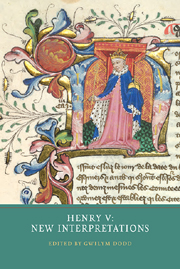Book contents
- Frontmatter
- Dedication
- Contents
- Preface and Acknowledgements
- List of Contributors
- Abbreviations
- Introduction
- 1 The Making of a Prince: The Finances of ‘the young lord Henry’, 1386–1400
- 2 Henry V's Establishment: Service, Loyalty and Reward in 1413
- 3 Henry V, Lancastrian Kingship and the Far North of England
- 4 Henry V's Suppression of the Oldcastle Revolt
- 5 Religion, Court Culture and Propaganda: The Chapel Royal in the Reign of Henry V
- 6 ‘Par le special commandement du roy’. Jewels and Plate Pledged for the Agincourt Expedition
- 7 Henry V and the Cheshire Tax Revolt of 1416
- 8 Henry V and the English Taxpayer
- 9 Henry V, Flower of Chivalry
- 10 War, Government and Commerce: The Towns of Lancastrian France under Henry V's Rule, 1417–22
- 11 Writing History in the Eighteenth Century: Thomas Goodwin's The History of the Reign of Henry the Fifth (1704)
- Index
- York Medieval Press: Publications
4 - Henry V's Suppression of the Oldcastle Revolt
Published online by Cambridge University Press: 05 July 2013
- Frontmatter
- Dedication
- Contents
- Preface and Acknowledgements
- List of Contributors
- Abbreviations
- Introduction
- 1 The Making of a Prince: The Finances of ‘the young lord Henry’, 1386–1400
- 2 Henry V's Establishment: Service, Loyalty and Reward in 1413
- 3 Henry V, Lancastrian Kingship and the Far North of England
- 4 Henry V's Suppression of the Oldcastle Revolt
- 5 Religion, Court Culture and Propaganda: The Chapel Royal in the Reign of Henry V
- 6 ‘Par le special commandement du roy’. Jewels and Plate Pledged for the Agincourt Expedition
- 7 Henry V and the Cheshire Tax Revolt of 1416
- 8 Henry V and the English Taxpayer
- 9 Henry V, Flower of Chivalry
- 10 War, Government and Commerce: The Towns of Lancastrian France under Henry V's Rule, 1417–22
- 11 Writing History in the Eighteenth Century: Thomas Goodwin's The History of the Reign of Henry the Fifth (1704)
- Index
- York Medieval Press: Publications
Summary
At the time of Henry V's unexpected demise in August 1422 contemporary commentators were fulsome in their praise of his qualities as a ruler and, above all, his achievements in the administration of justice. Exemplar justicie was among the personal attributes listed in the minutes of a meeting of the king's council just after his death, and a similar compliment was paid in the inscription Civitas Regis iusticie spotted on a wall over the entrance to London Bridge during the celebrations of his victory at Agincourt in 1415. French chroniclers in particular sang his praises as a paragon of justice, and the English writer John Hardyng lauded his success in law enforcement, albeit after the decades of chaos that followed his demise and with no small hankering after that comparative golden age. Was this reputation deserved? In his appraisal of criminal justice under Henry V, Ted Powell argued that, by and large, it was, although not in a conventional sense, and not through Henry's use of the existing common law channels, but often by extra-legal means, and above all, through the sheer force of his personality. This chapter will test this reputation further by examining closely how Henry dealt with what was the first, and arguably most profound, domestic challenge to his rule: the threat posed by the Lollard uprising led by Sir John Oldcastle in January 1414 and its aftermath – that is, the period during which the latter remained a fugitive from justice. How effectively did he deal with this threat and what were the means that he used?
- Type
- Chapter
- Information
- Henry VNew Interpretations, pp. 103 - 130Publisher: Boydell & BrewerPrint publication year: 2013



